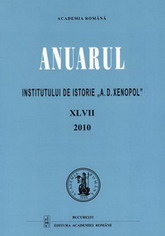„Fiindu atunci (…) legaţi cu prieteşugu”: note de terminologie medievală
"Being then (...) bound by Friendship": Notes of Medieval Terminology
Author(s): Cătălina ChelcuSubject(s): History
Published by: Editura Academiei Române
Keywords: friendship; meanings; chronicler’s writing; 17th century Moldavia; alliance
Summary/Abstract: In one of our papers on the juridical status of the institution of the princely Court in 17th century Moldavia we called attention to the term “prieteşug” (friendship) used by Grigore Ureche to illustrate the relationships between Moldavia and Poland since the foundation of the country to the first half of the 16th century, and identified the meaning of the word in the chronicler’s writing. In the current text we analyze the presence of this term in the chronicles of Grigore Ureche (with some corrections and additions to the previous paper), Miron Costin and Ion Neculce; in the last example, we focused, for the time being, on the events of the 17th century, with the intention to extend the research to the whole chronicle in a future study. The word itself appears in other medieval texts as well (juridical documents). According to the Romanian Language Dictionary (1984, Editura Academiei) the meanings of the word are: friendship, love, but it also has an obsolete meaning of “tight relationship between social groups, countries, peoples, nations, etc., based upon common aspirations, aims, interests, on friendship”. Behind this rich semantics, sometimes, in the case of the chroniclers’ writings, deliberately or involuntarily, hides a reality that differs from the one mirrored by other historical sources. Grigore Ureche turns out to have been biased, from this point of view, as regards some political documents, especially those where Stephen the Great plays a central role. In the case of Miron Costin, the ‘prieteşug’ between two persons, two state rulers or two states in this case, indicate good neighbouring relationships, the signing of an alliance or armistice. The corroboration with other historical sources proves the veracity of the fact told by the chronicler. On the other hand, in order to illustrate a conflicting situation, enmity, dissension, the chronicler uses the antonym of the term: ‘neprieteşug’, non-friendship, non-friend. The choice of the word ‘prieteşug’ and of its derivates in the chronicles of Grigore Ureche, Miron Costin and Ion Neculce is, in our opinion, a good opportunity to open a niche to the comprehension of the manner in which these authors seized the modifications of juridical status that occurred in Moldavia until the end of the 17th century. If the ‘prieteşug’ of Grigore Ureche’s text – mostly used when the relations between Moldavia and Poland until 1538 are brought forward – hides the author’s desire to illustrate the country’s glorious times, in Costin’s and Neculce’s chronicles the term has a wider meaning, spanning a multitude of political or military situations. We could conclude, as a result of our research, that the term ‘prieteşug’ had, originally, the meaning of alliance, which was gradually diluted, as Moldavia’s status was modified while the Ottoman domination increased.
Journal: Anuarul Institutului de Istorie »A.D. Xenopol« - Iaşi
- Issue Year: XLVII/2010
- Issue No: 47
- Page Range: 149-158
- Page Count: 9
- Language: Romanian

